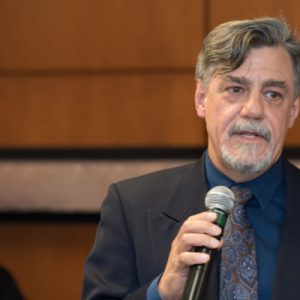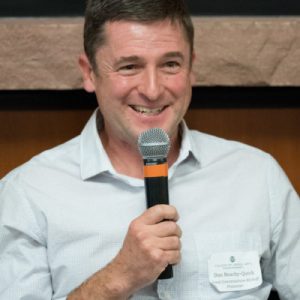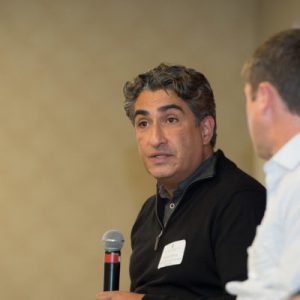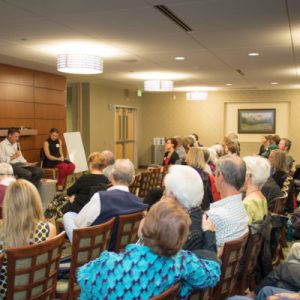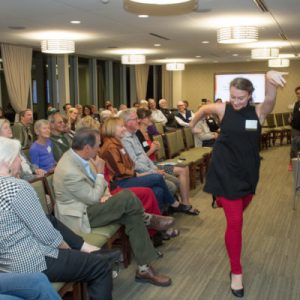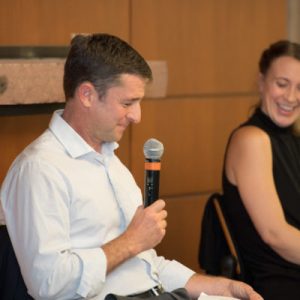Story by Kelly McDonnell. Originally published on SOURCE.
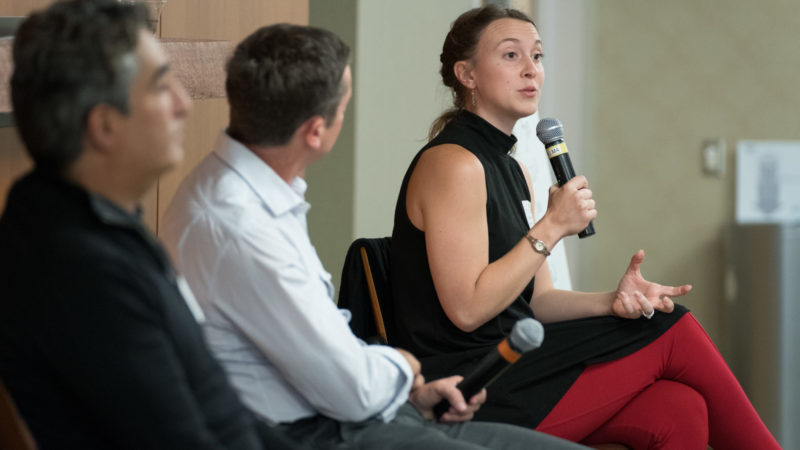
We live in a time of great change, including in our politics, policies, and in some cases, even our values. To meet these challenges, CSU continues to foster learning that develops our students into deep thinkers, who have the ability to move beyond polarization and create real, positive change. During the hour and a half Great Conversations 2018 Season Kickoff, three College of Liberal Arts faculty had a conversation with community members about just that: how rigor and imagination can be used as robust tools for uniting a polarized society and shaping the future of our world.
Three disciplines, three unique perspectives
The panelists for the Great Conversations Kickoff represent three distinct disciplines of the Liberal Arts. Madeline Harvey is an assistant professor of dance; Sammy Zahran is an assistant professor of economics, and Dan Beachy-Quick is a professor of English. Each presenter opened with a statement that revealed their individual perspectives about what makes the liberal arts valuable.
In his opening remarks, Zahran reflected that society today is undergoing a great rupture of trust and confidence.
“Because the country is divided increasingly into distinct communities of spirit, food is no longer entirely about nutrition, clothes are not about comfort, news is not about information, and similarly our politics is not about policy.” Zahran poses that these things are about signaling our status, our commitment to the groups we belong to and about raising or demoting the relative status of these groups and ourselves. In such a world, Zahran believes, the liberal arts are vital.
Beachy-Quick called on the imagination of past poets to remind us that imagination is the key to having an open mind. He shares that he worries that we have an atrophied sense of what imagination is and the role imagination plays in our day to day thinking.
He explains: “That we tend to have a suspicion that the student overly given to imagination is one who is removing him or herself from the fundaments of reality.” Beachy-Quick suspects, however, that imagination is an effort of human consciousness to return back to what is “so obviously and wonderfully in front of us.”
Harvey rounded out the introduction by involving the audience in an interpretive dance activity. She showed (instead of told) the audience how imagination, expression, and movement can be critical to understanding. Harvey illuminated that through the liberal arts, we co-create our reality, we collaborate, and allow space for diverse opinions, interpretations, and ideas to come together.
“We teach and we practice mindfulness, social and emotional availability, vulnerability, and risk taking. All of which are things I find absolutely essential to navigating this complex and polarized world in which we’re living,” shared Harvey.
The Liberal Arts are not alone
Toward the end of the evening, a College of Liberal Arts student proposed that it’s not entirely fair to claim that the liberal arts is the only college that has soul and imagination. She suggested, “if we are trying to work toward a less polarized society, we have to realize that all colleges on this campus embody as much soul as ours.” Her advice resonated among the audience.
Dean Benjamin C. Withers echoed this sentiment. He shared that in the land-grant tradition on which this university was founded, there was an emphasis on three things: agricultural education, mechanical education, and the liberal arts.
“The liberal arts were there from the birth of the university…there are elements of liberal arts in all disciplines” – from biology and math to the basics of agricultural sciences. He continued by saying that it’s through the liberal arts that we have an understanding of who we are and how we connect to the world around us, and ultimately become better thinkers and better citizens.
Another audience member summed up the evening with insightful eloquence: “We have to have the imagination to imagine a better world and to come up with strategies and ways of moving forward. Without imagination we are stuck where we are, and the world will never improve.”
Join in more Great Conversations
Now entering its 23rd year, the Great Conversations program is a community of engaged learners who receive unique access to learn from liberal arts faculty about their research, explore the latest scholarship out of the College of Liberal Arts, and participate in lively discussion around topics of local, national, and global importance. For more information about Great Conversations and upcoming events, visit www.libarts.colostate.edu/alumni-giving/great-conversations.
